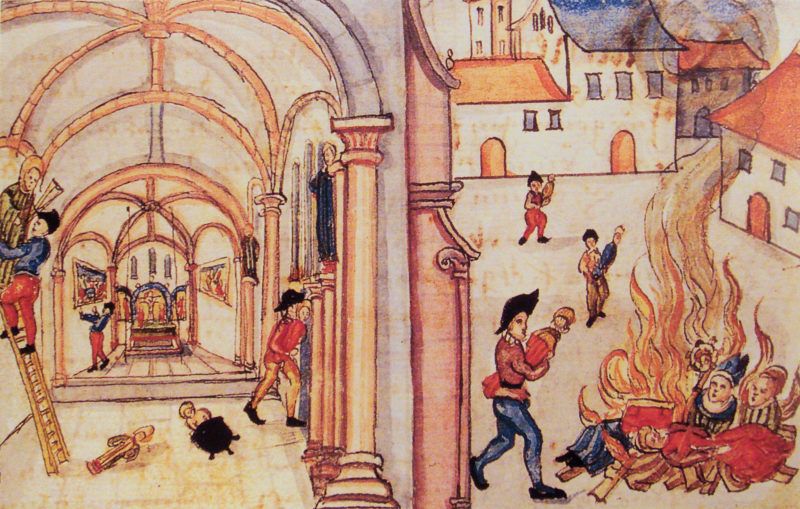The Lockdowns Are Killing the Arts

What’s closed in the arts? Nearly everything. Unless you want to switch on your laptop. Otherwise forget it. Hardly anyone is being paid for live performance of anything. Many volunteer choirs are banned from rehearsing.
No, a fundamentalist totalitarian cult has not taken over. Something else has happened.
Let’s look at the carnage, starting with my memories of the dawn of this disaster.
The two people sitting next to me in the bar at the train station were despondent. They worked on Broadway. One was an instrumental musician and the other a singer. They had just received word that Broadway was shutting down – forced closed by the governor.
This was the afternoon of March 12, 2020. Surely, they said, this would only be for a week or two, and I agreed. After all, this is Broadway! We toasted to a quick reopening.
That was 123 days ago. Two weeks ago, it became official. Broadway will remain closed for the rest of the year.
I have no idea what these nice people have done with their lives since then. Live music performances have been devastated by the lockdowns. Most of these artists live financially leveraged lives as it is, working and getting paid gig to gig. It’s their one great skill. Vast numbers of them have been forcibly unemployed.
I think of the pianist who plays at the local hotel lobby with a friend of his friends, the guitar band with a nightly gig at the pub, the choir conductor forced to sit on his hands for months, the band director who has no band, the movie director who sits on piles of promising scripts, the struggling painter who can’t display her art, the dancer with no opportunities for performance, the opera singer who faces 9 months of cancelled performances.
All of this in the name of disease management. Governments declared arts to be nonessential, dispensable, abolishable. It’s the biggest attack on art and beauty possibly since the iconoclasm of the 16th century, when mobs sacked churches, tore out paintings, and melted candlesticks in bonfires. Back then the motivation was to purify the world of sin. Now we think we are purifying the world of disease.
Here in the Berkshires, a regional tradition is the Tanglewood music festival. It’s the summer home for the Boston Symphony Orchestra. All seasons, there are symphonies and chamber concerts, attracting tens of thousands of people who sit on the lawn or indoors, and attend lectures. In times when classical music is suffering, Tanglewood figured out how to make it fashionable and even profitable.
This year it was cancelled. The years of preparation, the contracts, the recordings, the logistics, the training camps, the professionals and professors – it was all taken away by government edict. The beautiful grounds are empty. It’s not only an economic calamity. Instead it’s a tragedy for civilization.
And there’s more:
- New York Ballet: cancelled.
- Carnegie Hall and the Lincoln Center: closed for the rest of the year.
- Kennedy Center: shut down.
- Chicago Symphony: cancelled.
- Mormon Tabernacle Choir tour: cancelled.
- Art Galleries all over the country: closed by force or economic necessity.
- Chicago’s theater events: a long list of devastation.
- Church choirs all over the world: silenced.
- The legendary Blue Note jazz club: shuttered until further notice.
- A choir in Texas was excoriated in the press for “singing without masks” when the VP visited.
In the UK, the government has announced emergency funding for the arts including choirs to help with the pain. But as 200 leading musicians wrote the Telegraph, they would far rather just get back to rehearsing and performing.
A tradition of composition and performance that dates back 500 years, along with cathedrals and choir schools and performance halls, has been treated savagely by the government, as if none of this really matters.
Worse, these bureaucrats imagine that excellence in musical performance and teaching can be turned off and on like some kind of home appliance.
Consider, for example, the fate of children’s choirs. Director Charles Cole writes:
Children’s choirs are in a constant state of flux and development and boys’ voices undergo pronounced change which requires particular management. Throughout a choir, individuals are at different stages of sight-reading proficiency, pitching ability and general musical awareness. The younger ones apprentice from the older ones, with every child at a different stage on the journey. Through this process the transmission of the choral tradition itself takes place, encompassing the shared musical experiences, the collegiate knowledge of specific repertoire, and the choir’s unique sound itself, melded by the building in which it sings.
None of this can be simply put on hold; it has to be active in order to exist. This is certainly the case for the two choirs which I direct, the London Oratory Junior Choir and the London Oratory Schola, on whose behalf I wrote to Oliver Dowden MP, the Secretary of State for Digital, Culture, Media and Sport to express these concerns.
Cole only received a form letter back.
As a one-time choral conductor myself, I know how difficult it is to restart after just a few weeks off. But four months during prime performance season? It’s brutal and ignorant. How many years will it take to repair this damage? How many institutions are going to go belly up?
Imagine England without Handel’s Messiah, William Byrd or Thomas Tallis, or even the hymns of Ralph Vaughan Williams! Why would people have done this to our precious arts communities, and why are so few objecting or even talking about it?
For that matter, what is America without live jazz, Broadway, and the movies in theaters? What the hell is going on here?
The excuse is disease control, as if choirs and jazz clubs are nothing but germ spreading machines. There is no particular reason to believe it, given the wild exaggerations of the threat out there for a virus that reached its national fatality peak three months ago.
I will provide an empirical case from three weeks ago when I was among 400 plus people gathered from all over the country in a New Hampshire campground for Porcfest. There was no distancing and almost no mask wearing. You might think it would become a COVID petri dish based on the frenzy alive in the media. Actually a survey following the 3-day event turned up not one single case of sickness. Not one!
Based on this and piles of evidence mounting daily that the fatalities of this disease are predictably focused on the very old and sick, it seems hopelessly ignorant to have done this to the arts community.
A civilization without art is not a high civilization. Maybe it doesn’t even deserve the name.
Sometimes people use the word philistine to refer to someone who doesn’t appreciate art. If that’s true, what word can we use for those who abolish the arts by force?










